at some stage that we should cease to kill
our fellow creatures for the satisfaction of our bodily wants.
- Mahatma Gandhi
Share this on Facebook: Share
"In the most general terms, there are but two world views. One can take the view that life is sacred or that life is a commodity. A sacred view of life gives birth to feelings of duty, protection, and love. It emphasizes values of joy, beauty, happiness, and caring and sets up an internal constraint against the exploitation of other individuals, groups, or species. Our word sacred comes from the Latin sacer from the root seen also in sanus, sane. A sacred view of life, then, is a sane view of life. A commodity view is interested in profit, domination, and control. It seeks to "gain the world" and subjugate it to the will of man (and only "the fittest" men at that). At the core of the commodity view of life are two seeds: individual self-interest economics and man against nature technology. Planet Earth is choking on these seeds."
L.G. Boldt

-- "The New Story" The Dream of the Earth
Share this on Facebook: Share A deep chesty bawl echoes from rimrock to rimrock, rolls down the mountain, and fades into the far blackness of the night. It is an outburst of wild defiant sorrow, and of contempt for all the adversities of the world. Every living thing (and perhaps many a dead one as well) pays heed to that call. To the deer it is a reminder of the way of all flesh, to the pine a forecast of midnight scuffles and of blood upon the snow, to the coyote a promise of gleanings to come, to the cowman a threat of red ink at the bank, to the hunter a challenge of fang against bullet. Yet behind these obvious and immediate hopes and fears there lies a deeper meaning, known only to the mountain itself. Only the mountain has lived long enough to listen objectively to the howl of a wolf.
A deep chesty bawl echoes from rimrock to rimrock, rolls down the mountain, and fades into the far blackness of the night. It is an outburst of wild defiant sorrow, and of contempt for all the adversities of the world. Every living thing (and perhaps many a dead one as well) pays heed to that call. To the deer it is a reminder of the way of all flesh, to the pine a forecast of midnight scuffles and of blood upon the snow, to the coyote a promise of gleanings to come, to the cowman a threat of red ink at the bank, to the hunter a challenge of fang against bullet. Yet behind these obvious and immediate hopes and fears there lies a deeper meaning, known only to the mountain itself. Only the mountain has lived long enough to listen objectively to the howl of a wolf. Those unable to decipher the hidden meaning know nevertheless that it is there, for it is felt in all wolf country, and distinguishes that country from all other land. It tingles in the spine of all who hear wolves by night, or who scan their tracks by day. Even without sight or sound of wolf, it is implicit in a hundred small events: the midnight whinny of a pack horse, the rattle of rolling rocks, the bound of a fleeing deer, the way shadows lie under the spruces. Only the ineducable tyro can fail to sense the presence or absence of wolves, or the fact that mountains have a secret opinion about them.
My own conviction on this score dates from the day I saw a wolf die. We were eating lunch on a high rimrock, at the foot of which a turbulent river elbowed its way. We saw what we thought was a doe fording the torrent, her breast awash in white water. When she climbed the bank toward us and shook out her tail, we realized our error: it was a wolf. A half-dozen others, evidently grown pups, sprang from the willows and all joined in a welcoming melee of wagging tails and playful maulings. What was literally a pile of wolves writhed and tumbled in the center of an open flat at the foot of our rimrock.
In those days we had never heard of passing up a chance to kill a wolf. In a second we were pumping lead into the pack, but with more excitement than accuracy: how to aim a steep downhill shot is always confusing. When our rifles were empty, the old wolf was down, and a pup was dragging a leg into impassable slide-rocks.
We reached the old wolf in time to watch a fierce green fire dying in her eyes. I realized then, and have known ever since, that there was something new to me in those eyes - something known only to her and to the mountain. I was young then, and full of trigger-itch; I thought that because fewer wolves meant more deer, that no wolves would mean hunters' paradise. But after seeing the green fire die, I sensed that neither the wolf nor the mountain agreed with such a view.
Since then I have lived to see state after state extirpate its wolves. I have watched the face of many a newly wolfless mountain, and seen the south-facing slopes wrinkle with a maze of new deer trails. I have seen every edible bush and seedling browsed, first to anaemic desuetude, and then to death. I have seen every edible tree defoliated to the height of a saddlehorn. Such a mountain looks as if someone had given God a new pruning shears, and forbidden Him all other exercise. In the end the starved bones of the hoped-for deer herd, dead of its own too-much, bleach with the bones of the dead sage, or molder under the high-lined junipers.
I now suspect that just as a deer herd lives in mortal fear of its wolves, so does a mountain live in mortal fear of its deer. And perhaps with better cause, for while a buck pulled down by wolves can be replaced in two or three years, a range pulled down by too many deer may fail of replacement in as many decades. So also with cows. The cowman who cleans his range of wolves does not realize that he is taking over the wolf's job of trimming the herd to fit the range. He has not learned to think like a mountain. Hence we have dustbowls, and rivers washing the future into the sea.
 We all strive for safety, prosperity, comfort, long life, and dullness. The deer strives with his supple legs, the cowman with trap and poison, the statesman with pen, the most of us with machines, votes, and dollars, but it all comes to the same thing: peace in our time. A measure of success in this is all well enough, and perhaps is a requisite to objective thinking, but too much safety seems to yield only danger in the long run. Perhaps this is behind Thoreau's dictum: In wildness is the salvation of the world. Perhaps this is the hidden meaning in the howl of the wolf, long known among mountains, but seldom perceived among men.
We all strive for safety, prosperity, comfort, long life, and dullness. The deer strives with his supple legs, the cowman with trap and poison, the statesman with pen, the most of us with machines, votes, and dollars, but it all comes to the same thing: peace in our time. A measure of success in this is all well enough, and perhaps is a requisite to objective thinking, but too much safety seems to yield only danger in the long run. Perhaps this is behind Thoreau's dictum: In wildness is the salvation of the world. Perhaps this is the hidden meaning in the howl of the wolf, long known among mountains, but seldom perceived among men.

Codependency
For well over four years we have advertised at this site for someone willing to help write an article on codependency. We got around a dozen responses, but that was it: just an initial response and then nothing.
Symptoms of Codependency include overextending oneself and difficulty in following a project through. So, it soon became apparent that while we were going to get responses, we weren't really going to find anyone to help write this. We would have to do it alone.
So, here goes:
Codependency is a terrible term. It has endless connotations that have nothing to do with the disorder. Codependency itself is such a broad dysfunction that it is extremely hard to define in concise terms. However, one therapist and friend summed up the condition thus: "I only wanted to be loved." Another simple definition that works is, "Codependency is a dysfunctional relationship with the self."
Codependency is habitual behaviors that are ultimately self-destructive. Almost everyone (at times) has symptoms of codependency. No one escapes.
Codependent behaviors can be stopped. Therapists, books, support groups, and constant and careful self-monitoring will help. In the end, healing from codependency is ultimately up to the individual.
The following are a list of symptoms. Few have them all, some have a few, and many symptoms are contradictory, but that is the irony of Codependency. For more symptoms you can click here and visit another site on the web.
Care taking: the codependent individual feels responsible for other people. S/He feels anxious and even guilty when another has a problem. S/He feels compelled to help that person solve their problem. S/He anticipates the other's needs and feels angry when his help is not effective or rebuffed. At the same time, the codependent feels slighted that others won't help her/him out when s/he needs help. However, this same individual who is constantly doing way too much for others, and not getting "any" help from anyone, will usually answer when asked what is wrong or what do you need, responds, "Oh, nothing." The codependent minimizes his/her own worth. The codependent is his/her own worst enemy.
The codependent is over committed, harried, pressured, feels safe when giving, but insecure when someone gives to him/her, goes out of her/his way to help others, and believes deep inside that other people are responsible for the way they are and will blame others for the "spot" they are in. Others make them feel the way they feel, they are victimized, angry, unappreciated, and used. Others are driving them crazy.
Low Self Worth: codependents tend to come from troubled, dysfunctional families, and will deny this to the very end. They blame themselves for their family's shortcomings. They blame themselves for everything. They pick on themselves constantly: not intelligent enough, not pretty enough, not smart enough, not athletic enough, not good enough. But if another criticizes them, boy do they get defensive and angry, not to mention self-righteous. Don't try to give a codependent a compliment; they reject all compliments and praise, even though they get depressed from lack of compliments and praise. They feel "different" from the rest of the world. They reject themselves, but fear rejection. Everything is taken personally, they love being the victim (though will deny it with their last breath). They have been victims of sexual, physical, or emotional abuse, abandonment, neglect, and/or alcoholism. They feel like victims, carry lots of guilt and shame, and think their lives are not worth living. They should have done this, should have done that. They "should" themselves to death. Codependents say, "Why me?" on the outside, and know "why me" on the inside. While trying to prove to others that they are good enough, to themselves they are worthless and empty.
Repression: most codependents repress their own needs, their own desires. They are afraid to let themselves be who they are and often appear rigid and controlled. They repress all thoughts of self worth out of their awareness and they are full of guilt. Codependents cannot have fun.
Obsessive Compulsive Disorder: codependents worry. They worry about the slightest and silliest things: they worry that people are talking about them; they worry that people are not talking about them; they lose sleep over little things; they check up on others; they try to catch people in the act; they never find any answers, they focus on other's problems; they spend money compulsively; eat or drink compulsively; and wonder why they have no energy and why they never get anything done.
Controlling Behaviors: codependents try to control events and people through helplessness, guilt, coercion, threats, advice-giving, manipulation, or domination. They are afraid to let people be who they are or let events happen naturally. They've lived in so many situations in which they had no control (abuse, alcoholism, etc) that they now try to control everything and get frustrated and angry when they cannot. They end up feeling controlled by events. They feel controlled by others. They resist change as if change were a contagion.
Denial: codependents ignore problems or pretend they do not exist. They pretend things are not as bad as they are; they tell themselves it will get better; they stay busy to avoid thinking about things; they get confused, sick, depressed and visit doctors for a prescription. Many are workaholics. They lie to themselves and others. They believe their lies. And most of all, codependents will leave a healthy situation (by lying to themselves that it was an unhealthy situation) and get back into an unhealthy situation; though for the most part, most codependents either never leave an unhealthy situation/relationship, or they go from one unhealthy situation/relationship to another.
Dependency: codependents do not feel happy or content with themselves. They look to others to supply them their happiness or their needs. They are threatened by the loss of anything or any person that provides them with their happiness. They do NOT love themselves. They did not feel loved by their parents. They equate love with pain and believe others are never, ever there for them. They need people more than they want them; their lives revolve around someone else's life; they tolerate abuse; feel trapped; leave one bad relationship and jump into another bad relationship. They wonder if they will ever find true love. And if they do find true love, they will leave that and find a loveless relationship because deep inside (often beneath consciousness) they feel unworthy of love.
Poor Communication Skills: codependents blame, threaten, coerce, beg, bribe, and advise others. They don't mean what they say and don't say what they mean. They don't take themselves seriously and expect others to do the same. They avoid getting to the point, asking indirectly for attention by sighing, crying, or moping around. They say everything is their fault. They say nothing is their fault. They can't get to the point, and if pressed, they're not sure what the point really is. They believe their opinions do not matter and have difficulties asserting their rights or expressing honest emotions, openly and appropriately. They apologize for bothering people.
Poor Boundaries: codependents say they won't tolerate something from anyone, and then engage themselves in exactly that. Then they gradually increase their tolerance levels till they can tolerate most anything others do to them. They allow others to hurt them, over and over and over again. They stay in bad relationships for all the wrong reasons: to fix the other; for the kids (like kids need to grow up in a loveless relationship); because things will get better; and worst of all: because they feel they deserve to live in hell. They complain and blame but far too many never get away from their abuser. Then they finally get angry and become totally intolerant and the cycle begins all over again. (For a list of unhealthy boundaries from Recovery.org, click here.)
Lack of Trust: codependents do not trust themselves, their feelings, their decisions, other people, or even God. And then, right out of the blue, they'll trust someone who is totally untrustworthy.
Sexual Problems: codependents go through cycles in the bedroom. They are caretakers there too. They have sex when they don't want to or withdraw sex to punish their partner. They try to have sex when they are hurt or angry, and refuse to enjoy it. They withdraw emotionally from their partner, feel revulsion toward their partner, and don't want to talk about it. They reduce sex to a technical act, wonder why they don't enjoy it; lose interest; make up reasons to abstain, wish their partner would die, go away, or guess what is wrong with them; they have strong sexual fantasies about others and consider having affairs.
General: codependents can be extremely responsible or irresponsible, they become martyrs, sacrificing their own happiness. They find it difficult to be happy, feel close to others, or have fun and be spontaneous. They are passive aggressive, feeling passive, hurt, helpless yet violent and angry. They laugh when they want to cry. They are ashamed of their families, of their relationships. They cover up, lie, and protect their family from their problems. They don't seek help because they don't feel the problem is all that bad. And then they wonder why the problems never go away.
Progressively, if the codependent does not get help, the symptoms above just get worse. The codependent becomes lethargic and depressed and eventually withdraw and isolate themselves. Their daily routine falls by the wayside. They abuse or neglect the people who depend on them, mostly, their children. They feel utterly hopeless and initiate plans to escape. They contemplate suicide. They become violent, or seriously mentally or physically ill. They develop an eating (drinking or drug) disorder.
Not all codependents have all of the above symptoms. If you have just 20% of the above symptoms, you can consider yourself a codependent. If you have 5 to 10% of the above symptoms, you are normal. Normal people are, at times, codependent. Even normal people can use a bit of therapy, a bit of healing.
We are all, in many ways, self-destructive. None of us came from the Cleaver Family, Father does not know best, and our mothers were never as perfect as Donna Reed.
The worst thing about being codependent is that the codependent wastes her/his life. The next worst thing about being codependent is we pass it on to our children, and in them, our symptoms are hugely magnified.
The one question is how did we get this way?
Prolonged exposure to oppression is the key here. As Earnie Larson states in his books and lectures (I'm paraphrasing here): "What we live with we learn; what we learn we practice; what we practice becomes habit; our habits have consequences."
All of these behaviors are "learned." They can be unlearned.
Everything boils down to this: we have little self worth; our happiness is found outside of ourselves.
However, Earnie Larson has one more wonderful phrase that really sums up the codependent's situation or dilemma: "If nothing changes, nothing changes."
We, the codependent, must DO something to initiate healing. It won't come from outside. It just doesn't happen. If nothing changes, nothing changes.
Healing Codependency
Most people do not heal their codependency on their own. Let us face it, with all these symptoms flaring up, especially the denial, who could possibly see a way out?
Most codependents are slapped upside the head by a friend: "Hey, you need help!"
We do need help. We need the experience of others who have broken the cycles. We need a good therapist to help us see the light. We need friends who are open and honest with us. We need to sit and read a bit about ourselves, our problems, and the way out. Most of all, we need to know that we can be healed. This is NOT a permanent situation. But each person has to recognize the problem, admit to it, and then find the tools to help end it.
The first and most important thing for a codependent to learn is that Happiness is inside of us, not something outside. A good relationship is good, not because of the person we love, but because of the person we are. One person does not a relationship make.
Healing codependency is often referred to as "shifting our relationship with ourselves." Codependents must learn to accept their powerlessness over people and events. Recovery for a codependent is like recovery from alcohol or drug addiction and the same 12-step model is oftentimes employed: Let Go. Let God.
The codependent must sometimes "fire" the people in their lives. If they are not willing to work through their issues, then we have to "fire" them and move on ourselves. But we must keep in mind that this is about us, not them. Recovery means learning to take responsibility for our own actions, issues, feelings, behaviors, and our lives.
Recovery is not easy. Letting go of the need to control people, places, events is not easy. It is highly recommended to find a Codependent Anonymous (CoDA) group and attend regularly. Meetings, therapy, talking to fellow codependents, and reading and just plain being aware of our feelings and thoughts will ultimately set us free from our self-defeating patterns; from our fear and shame. Letting go of caretaking and all the energy expended in that fulltime effort frees up our energies to more constructive things. Below are links to more information, a place to locate a CoDA meeting, and further reading.
But finally know this: Your author has been through his own bouts with codependency. Hardly any of us are untouched by this. Healing is not only possible, it is wonderfully exhilarating. Once we step out of our destructive patterns, anything is possible. In a letter to a friend once, I wrote the following that I want to share with you.
Old problems are much more comfortable than new solutions. But always keep in mind, that life begins on the edge of your comfort zone.
Trust and listen to your intuition. If you listen to your mind, you will hear only the same old crap it’s been spewing for years. Unless you heal your past, your life, and recover from the abuse (self-inflicted and other-inflicted) your mind will not be your friend. Listen to your heart. Go with the flow.
According to A Course in Miracles, we come from either a place of fear or a place of love. From a place of love, we can do no wrong. From a place of fear, every action is a mistake. Fill your heart with love and you will surpass even your highest expectations.
There are web sites:
To learn more about Codependents Anonymous or find a CoDA support group meeting in your area, go to http://www.codependents.org.
Codependents Anonymous Online: www.onlinecoda.net
Stop Domestic Violence: Women In Distress: http://www.womenindistress.com
Verbal Abuse Precedes Domestic Violence: http://www.verbalabuse.com/10.shtml
12 Steps & Codependency Workbook: www.proactive-coach.com/12steps
Recovery: http://www.allaboutcounseling.com/codependency.htm
Codependency recovery, inner child healing, Joyous Spirituality: http://www.silcom.com/~joy2meu/
Find a good therapist, or even some place that deals with domestic abuse, be it physical, emotional or mental abuse. They can help you if you are in any kind of relationship where codependency or abuse exists. It is, after all, self abuse if you stay in an unhealthy relationship. They will help empower you to become your own person, which will in turn help you decide if you should stay in a relationship or leave it.
Further Reading:
One of the most influential books of our age is a thin piece of wisdom called the Four Agreements. I highly recommend this book to everyone. These are simple lessons for a complex time.

The Four Agreements: A Practical Guide to Personal Freedom

Language of Letting Go: Daily Meditations for Codependents

Codependent No More: How to Stop Controlling Others and Start Caring for Yourself
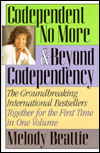
Codependent No More and Beyond Codependency
Codependents' Guide to the Twelve Steps

More Language of Letting Go: 366 New Meditations by Melody Beattie

Adult Child's Guide to What Is "Normal": Being Functional in a Dysfunctional World
Adult Child's Guide to What Is "Normal": Being Functional in a Dysfunctional World
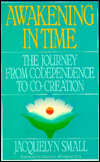
Awakening in Time: The Journey from Codependence to Co-creation

Belonging: Bonds of Healing and Recovery

Beyond Codependency: And Getting Better All the Time
Beyond Codependency: And Getting Better All the Time
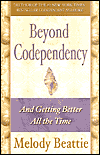
Beyond Codependency: And Getting Better All the Time
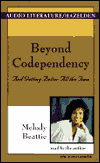
Beyond Codependency: And Getting Better All the Time
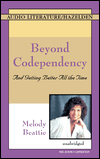
Beyond Codependency: And Getting Better All the Time (audio..six cassettes)

Boundaries: Where You End and I Begin

Boundaries and Relationships: Knowing, Protecting and Enjoying the Self
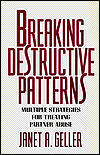
Breaking Destructive Patterns: Multiple Strategies for Treating Partner Abuse

Breaking Free: A Recovery Handbook for Facing Codependence
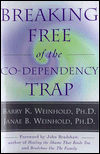
Breaking Free of the Co-Dependency Trap
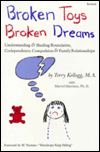
Broken Toys, Broken Dreams: Understanding and Healing Codependency, Compulsive Behaviors, and Family

Choicemaking: For Co-Dependents, Adult Children and Spirituality Seekers

Claiming Your Self Esteem: A Guide out of Codependency Addiction and Other Useless Habits
Co-Dependency: Issues in Treatment and Recovery
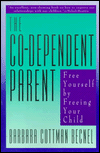
The Co-Dependent Parent: Free Yourself by Freeing Your Child
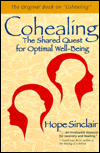
Cohealing: The Shared Quest for Optimal Well-Being
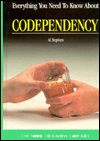
Everything You Need to Know about Codependency

Facing Codependence: What It Is, Where It Comes from, How It Sabotages Our Lives

Flying Boy: Healing the Wounded Man

Healing the Child Within: Discovery and Recovery for Adult Children of Dysfunctional Families

How Can It Look so Good... and Feel so Bad?
The Illusion of Love : Why the Battered Woman Returns to Her Abuser

Is It Love or Is It Addiction?

Verbally Abusive Relationship: How to Recognize It and how to Respond

Before It's Too Late: Helping Women in Abusive or Controlling Relationships

Abused Men: The Hidden Side of Domestic Violence

I Hate You, Don't Leave Me: Understanding the Borderline Personality
Breaking Free from Partner Abuse: Voices of Battered Women Caught in the Cycle of Domestic Violence
Chain Chain Change: For Black Women in Abusive Relationships


